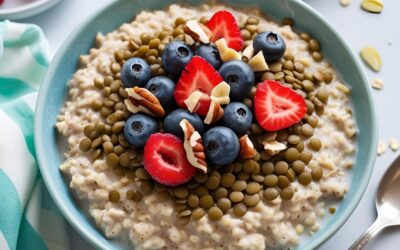Maintaining thyroid health in good shape is vital for overall well-being, as the thyroid gland plays a huge role in regulating metabolism, energy levels, and hormonal balance. Adopting a vegetarian diet can be beneficial for people seeking to support their thyroid function. This blog explores how a plant-based diet can positively impact thyroid health, particularly in managing conditions like hypothyroidism and hyperthyroidism, and how Weight Loss Programs Canada can help you in maintaining your thyroid health.
Nutrient-Rich Foods for Thyroid Function
A vegetarian diet is rich in whole foods that provide essential nutrients for thyroid health. Key nutrients include:
Iodine: This mineral is essential for the production of thyroid hormones. While iodine is commonly found in seafood and dairy, vegetarians can obtain it from iodized salt and sea vegetables like nori and kelp.
Zinc: Important for activating thyroid hormones, zinc can be found in legumes, whole grains, nuts, and seeds. Incorporating these foods into your diet helps regulate TSH (thyroid-stimulating hormone) levels.
Selenium: This antioxidant mineral supports the conversion of T4 (inactive hormone) to T3 (active hormone). Brazil nuts have abundant selenium, making them a great addition to a vegetarian diet.
In case you are facing any health issue with Thyroid contact Holistic Nutritionist Surrey to get a proper diet plan.
Antioxidants and Anti-Inflammatory Properties
Plant-based foods are a rich source of compounds like antioxidants and anti-inflammatory, which can help fight oxidative stress and inflammation linked to thyroid disorders. Foods such as fruits, vegetables, nuts, and seeds are packed with vitamins A, C, E, and various phytochemicals that support overall health.
Evidence suggests that the high concentration of immune-boosting antioxidants found in plant foods contributes to better health outcomes for individuals with thyroid issues. By reducing inflammation through dietary choices, vegetarians may experience improved thyroid function and reduced symptoms related to autoimmune conditions like Hashimoto’s thyroiditis.
Managing Goitrogens
While some plant foods contain goitrogens—compounds that can interfere with thyroid function—cooking these foods often reduces their goitrogenic effects. Cruciferous vegetables like broccoli, kale, and cauliflower are some foods that can be included in moderation when cooked properly. For those with hypothyroidism, it’s important to maintain a balanced intake of these vegetables while ensuring adequate iodine and selenium levels in the diet. Cooking methods like steaming or sautéing can deactivate goitrogens without sacrificing nutritional value.
Weight Management and Metabolism
A vegetarian diet can be helpful in weight management, which is important for persons with hypothyroidism who may experience weight gain due to slowed metabolism. Plant-based diets have lower calories yet high in fiber, promoting satiety and helping maintain a healthy weight. Incorporating various whole grains, legumes, fruits, and vegetables can support metabolic health while providing essential nutrients that may be lacking in a traditional omnivorous diet.
Reducing Autoimmune Risks
Research indicates that vegetarian diets may be associated with lower prevalence rates of autoimmune diseases, including those affecting the thyroid gland. By focusing on whole plant foods and reduction of the intake of processed foods high in sugar and unhealthy fats, vegetarians may lower their risk of developing autoimmune conditions.A study highlighted that individuals following vegan or vegetarian diets had a reduced risk of hyperthyroidism compared to those consuming omnivorous diets. This protective effect may stem from the anti-inflammatory properties of plant-based foods.
The Role of Hydration and Lifestyle Factors
In addition to dietary choices, hydration and lifestyle factors play a crucial role in supporting thyroid health. Staying adequately hydrated is essential for maintaining metabolic processes and overall bodily function. Water helps transport nutrients throughout the body, including those vital for thyroid hormone production.
Hydration Tips:
Drink Plenty of Water: Drink plenty of water a day, adjusting based on your activity level and climate.
Include Hydrating Foods: Incorporate fruits and vegetables with high water content, such as cucumbers, watermelon, and oranges, into your meals.
Lifestyle Factors:
Regular Exercise: Engaging in regular physical exercises can help stimulate metabolism and improve energy levels. Activities such as yoga, walking, or strength training can be good for those with thyroid issues.
Stress Management: Chronic stress negatively impacts thyroid function by raising cortisol levels, which may interfere with hormone production. Practices such as meditation, deep breathing exercises, and mindfulness can help reduce stress and promote overall well-being.
Sleep Quality: Prioritising good sleeping habits is a key to hormone regulation. Aim for 7-9 hours of quality sleep schedule each night to support your thyroid health and overall metabolic function.
Incorporating a vegetarian diet can significantly benefit thyroid health by providing essential nutrients, reducing inflammation, and promoting a healthier lifestyle overall. By focusing on hydration, regular exercise, stress management, and quality sleep alongside a nutrient-rich plant-based diet, individuals can create a comprehensive approach to support their thyroid function.
For those managing thyroid conditions or seeking to improve their overall health, consulting with healthcare professionals or nutritionists can help tailor dietary choices to meet specific needs. Embracing a vegetarian lifestyle not only contributes to better thyroid health but also fosters overall well-being through mindful eating practices.




